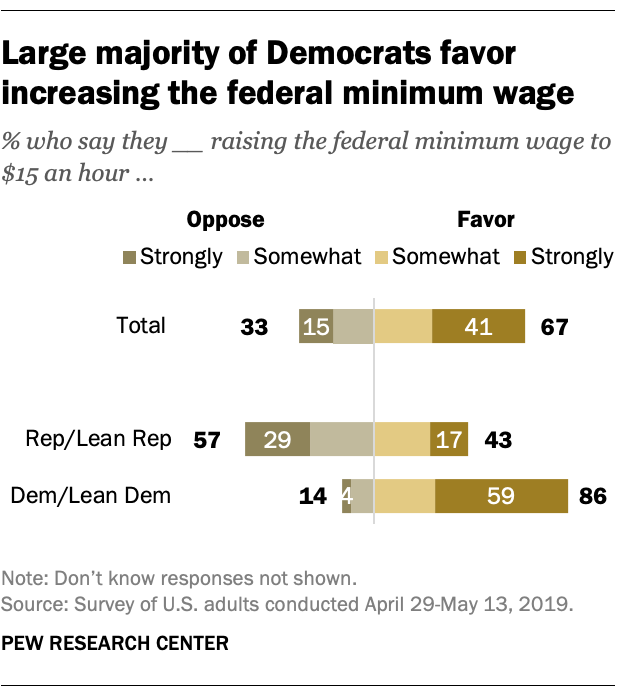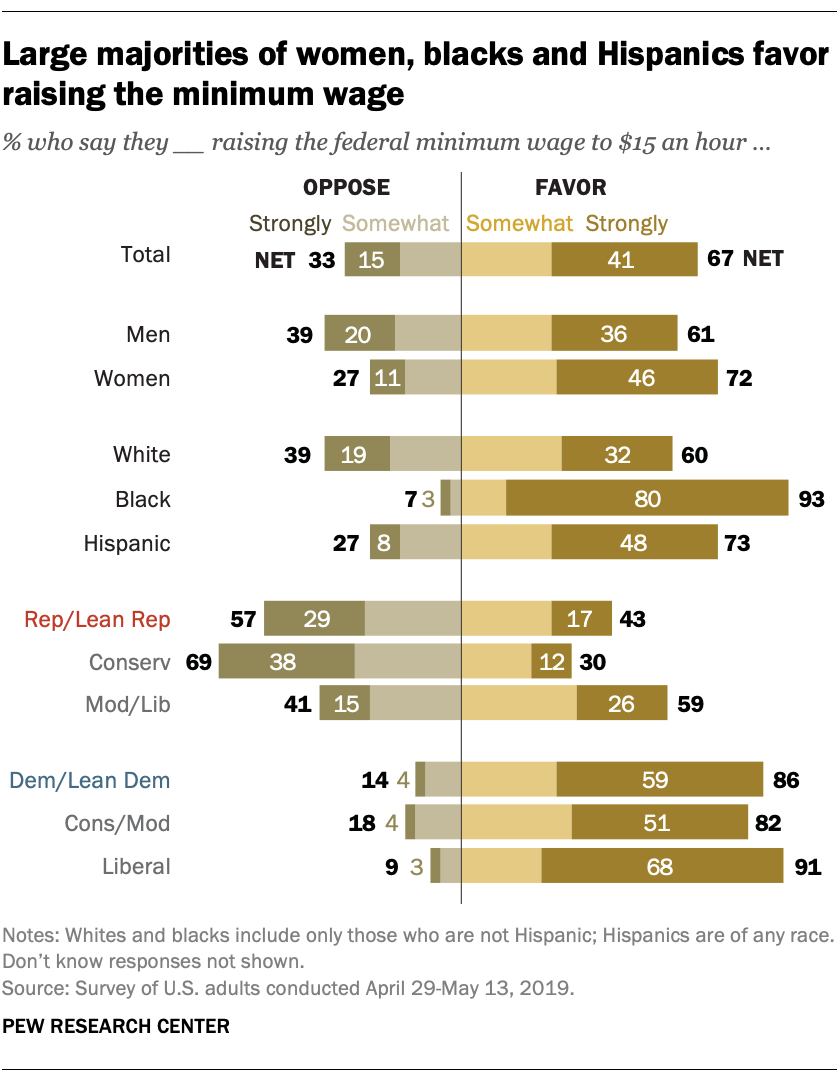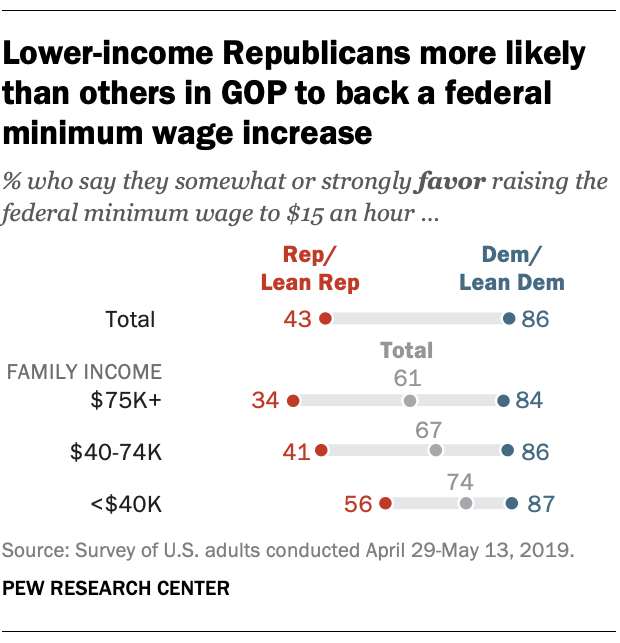Two-thirds of Americans favor raising federal minimum wage to $15 an hour
BY LESLIE DAVIS AND HANNAH HARTIG\
NEWS IN THE NUMBERS
JULY 30, 2019
By a wide margin, Americans say they favor raising the federal minimum wage to $15 an hour. But there is a deep partisan divide in views of this proposed policy – a version of which recently passed the Democratic-controlled House of Representatives, though it is unlikely to be taken up by the GOP-controlled Senate.
Two-thirds of Americans (67%) support raising the minimum wage to $15 an hour, including 41% who say they strongly favor such an increase, according to a Pew Research Center survey conducted this spring.

Democrats and Democratic-leaning independents are largely united in backing a $15 an hour federal minimum wage: 86% favor this, including nearly six-in-ten (59%) who say they strongly support it.
Republican opinion on this issue is more divided, but a majority of Republicans and Republican leaners – 57% – oppose raising the minimum wage to $15 an hour, including nearly three-in-ten (29%) who say they are strongly against it.
The current federal minimum wage is $7.25 an hour, though many states have higher minimum wages.

Republican opinion on this issue is more divided, but a majority of Republicans and Republican leaners – 57% – oppose raising the minimum wage to $15 an hour, including nearly three-in-ten (29%) who say they are strongly against it.
The current federal minimum wage is $7.25 an hour, though many states have higher minimum wages.

Majorities of women and men, whites, blacks and Hispanics favor increasing the federal minimum wage to $15 an hour, though there are demographic differences in how widespread support for this policy is.
Women are more likely than men to support raising the federal minimum wage to $15 an hour (72% vs. 61%, respectively). About nine-in-ten black Americans (93%) support this increase – including 80% who express strong support – compared with about three-quarters of Hispanics (73%) and six-in-ten whites.
There is a stark ideological gap in support for a $15 federal minimum wage among Republicans. Conservative Republicans oppose an increase by more than two-to-one (69% vs. 30%), but a majority of moderate and liberal Republicans (59%) favor such an increase.
In contrast, there are more modest ideological differences on this issue among Democrats. Overwhelming majorities of both liberal Democrats (91%) and conservative and moderate Democrats (82%) favor raising the minimum wage to $15 an hour, but liberal Democrats are substantially more likely to say they strongly favor this policy (68% vs. 51%).

Women are more likely than men to support raising the federal minimum wage to $15 an hour (72% vs. 61%, respectively). About nine-in-ten black Americans (93%) support this increase – including 80% who express strong support – compared with about three-quarters of Hispanics (73%) and six-in-ten whites.
There is a stark ideological gap in support for a $15 federal minimum wage among Republicans. Conservative Republicans oppose an increase by more than two-to-one (69% vs. 30%), but a majority of moderate and liberal Republicans (59%) favor such an increase.
In contrast, there are more modest ideological differences on this issue among Democrats. Overwhelming majorities of both liberal Democrats (91%) and conservative and moderate Democrats (82%) favor raising the minimum wage to $15 an hour, but liberal Democrats are substantially more likely to say they strongly favor this policy (68% vs. 51%).

Majorities across all income levels favor a $15 federal minimum wage. Nearly three-quarters (74%) of those with annual family incomes of less than $40,000 favor this increase, as does a narrower majority of those with family incomes of $75,000 or more (61%).
At least eight-in-ten Democrats across all income levels back this increase. In contrast, lower-income Republicans are more likely than those with higher incomes to support this proposal: 56% of Republicans with annual incomes of less than $40,000 say they favor raising the federal minimum wage to $15 an hour, compared with 34% of Republicans with incomes of $75,000 or more.
Leslie Davis is an intern at Pew Research Center.
Hannah Hartig is a research associate focusing on U.S. politics and policy research at Pew Research Center.
At least eight-in-ten Democrats across all income levels back this increase. In contrast, lower-income Republicans are more likely than those with higher incomes to support this proposal: 56% of Republicans with annual incomes of less than $40,000 say they favor raising the federal minimum wage to $15 an hour, compared with 34% of Republicans with incomes of $75,000 or more.
Leslie Davis is an intern at Pew Research Center.
Hannah Hartig is a research associate focusing on U.S. politics and policy research at Pew Research Center.

No comments:
Post a Comment